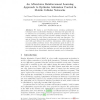Free Online Productivity Tools
i2Speak
i2Symbol
i2OCR
iTex2Img
iWeb2Print
iWeb2Shot
i2Type
iPdf2Split
iPdf2Merge
i2Bopomofo
i2Arabic
i2Style
i2Image
i2PDF
iLatex2Rtf
Sci2ools
114
click to vote
EURONGI
2005
Springer
2005
Springer
An Afterstates Reinforcement Learning Approach to Optimize Admission Control in Mobile Cellular Networks
We deploy a novel Reinforcement Learning optimization technique based on afterstates learning to determine the gain that can be achieved by incorporating movement prediction information in the session admission control process in mobile cellular networks. The novel technique is able to find better solutions and with less dispersion. The gain is obtained by evaluating the performance of optimal policies achieved with and without the predictive information, while taking into account possible prediction errors. The prediction agent is able to determine the handover instants both stochastically and deterministically. Numerical results show significant performance gains when the predictive information is used in the admission process, and that higher gains are obtained when deterministic handover instants can be determined.
| Added | 27 Jun 2010 |
| Updated | 27 Jun 2010 |
| Type | Conference |
| Year | 2005 |
| Where | EURONGI |
| Authors | José Manuel Giménez-Guzmán, Jorge Martínez-Bauset, Vicent Pla |
Comments (0)

